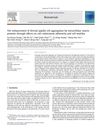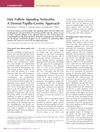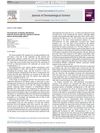Search
for
Sort by
Research
900-930 / 1000+ results
research Ectodysplasin-A2 Induces Dickkopf 1 Expression in Human Balding Dermal Papilla Cells Overexpressing the Ectodysplasin A2 Receptor
A protein called ectodysplasin-A2 increases a hair growth inhibitor in balding cells, which could be a target for hair loss treatment.
research A Comparison of the Culture and Growth of Dermal Papilla Cells from Hair Follicles from Non-Balding and Balding (Androgenetic Alopecia) Scalp
research Roles of Testosterone in the Growth of Keratinocytes Through Bald Frontal Dermal Papilla Cells

research Hypoxic Response of the Expression of TGF-β2 and BMP4 in Human Dermal Papilla Cells
Low oxygen levels affect the behavior of certain proteins in human skin cells.
research Effects of Licorice on Synthesis of Vascular Endothelial Growth Factor in Human Dermal Papilla Cells
Licorice may help increase hair growth.
research Androgens and the Hair Follicle: Cultured Human Dermal Papilla Cells as a Model System
research Inhibitory Effects of bFGF, VEGF, and Minoxidil on Collagen Synthesis by Cultured Hair Dermal Papilla Cells

research Erratum to: Squarticles as a Lipid Nanocarrier for Delivering Diphencyprone and Minoxidil to Hair Follicles and Human Dermal Papilla Cells
research Effect of VEGF and Minoxidil on the Production of Arachidonic Acid Metabolites by Cultured Hair Dermal Papilla Cells

research Nature-Derived Lignan Compound VB-1 Exerts Hair Growth-Promoting Effects by Augmenting Wnt/β-Catenin Signaling in Human Dermal Papilla Cells
A natural compound called VB-1 can help promote hair growth by boosting a specific cell signal in human skin cells.

research Dermal Papilla Cell Number Specifies Hair Size, Shape, and Cycling, and Its Reduction Causes Follicular Decline
More dermal papilla cells in hair follicles lead to larger, healthier hair, while fewer cells cause hair thinning and loss.

research Extracellular Vesicles Derived from MSCs Activate Dermal Papilla Cells In Vitro and Promote Hair Follicle Conversion from Telogen to Anagen in Mice
Tiny particles from stem cells help activate hair growth cells and encourage hair growth in mice without being toxic.

research The Enhancement of Dermal Papilla Cell Aggregation by Extracellular Matrix Proteins Through Effects on Cell–Substratum Adhesivity and Cell Motility
Skin cell clumping for hair growth is improved by a protein called fibronectin, which helps cells stick and move better.

research Combination of Herbal Extracts and Platelet-Rich Plasma Induced Dermal Papilla Cell Proliferation: Involvement of ERK and Akt Pathways
Herbal extracts and platelet-rich plasma together may help increase hair growth by making certain cells grow more, through specific cell growth pathways.
research Extracellular Vesicles from Activated Dermal Fibroblasts Stimulate Hair Follicle Growth Through Dermal Papilla-Secreted Norrin
Special particles from skin cells can promote hair growth by activating a specific growth signal.
research Regulation of Human Dermal Papilla Cell Production of Insulin-Like Growth Factor Binding Protein-3 by Retinoic Acid, Glucocorticoids, and Insulin-Like Growth Factor-1
Retinoic acid, glucocorticoids, and IGF1 increase IGFBP-3 production in human dermal papilla cells, affecting hair growth.

research Hair Follicle Signaling Networks: A Dermal Papilla–Centric Approach
The document concludes that dermal papilla cells are key for hair growth and could be used in new hair loss treatments.

research Large-Scale Cultivation of Transplantable Dermal Papilla Cellular Aggregates Using Microfabricated PDMS Arrays
Researchers developed a method to grow hair follicle cells for transplantation using a special chip.

research iTRAQ-Based Quantitative Proteomic Comparison of Early- and Late-Passage Human Dermal Papilla Cell Secretome in Relation to Inducing Hair Follicle Regeneration
Early-stage skin cells help regenerate hair follicles, with proteins SDF1, MMP3, biglycan, and LTBP1 playing key roles.

research Overexpression of Alkaline Phosphatase Improves the Hair-Inductive Capacity of Cultured Human Dermal Papilla Spheres
Increasing alkaline phosphatase in human skin cells helps to grow more hair.
research Human iPS Cell-Derived Cell Aggregates Exhibited Dermal Papilla Cell Properties in In Vitro Three-Dimensional Assemblage Mimicking Hair Follicle Structures
Scientists made structures that look like human hair follicles using stem cells, which could help grow hair without using actual human tissue.
research Comprehensive Transcriptome Analysis of Hair Follicle Morphogenesis Reveals That lncRNA-H19 Promotes Dermal Papilla Cell Proliferation Through the Chi-miR-214-3p/Beta-Catenin Axis in Cashmere Goats
The research found that the molecule lncRNA-H19 helps hair follicle cells grow by affecting certain cell pathways in cashmere goats.
research Proteomics Demonstration That Histone H4 Is a Colchicine-Induced Retro-Modulator of Growth and Alkaline Phosphatase Activity in Hair Follicle Dermal Papilla Culture
Histone H4, released by cells exposed to colchicine, can cause hair loss by inhibiting cell growth and enzyme activity.

research Triterpenes in the Ethanol Extract of Poria Cocos Induce Dermal Papilla Cell Proliferation
The ethanol extract of Poria cocos helps skin cells to grow.

research Dermal Papilla Regulation of Hair Growth and Pigmentation
Dermal papilla cells are key for hair growth and color, influencing hair type and size, and their interaction with stem cells could help treat hair loss and color disorders.
research Optimal Stimulation Toward the Dermal Papilla Lineage Can Be Promoted by Combined Use of Osteogenic and Adipogenic Inducers
Combining specific inducers helps dermal papilla cells regain hair-forming ability.

research Establishment and Characterization of Matched Immortalized Human Frontal and Occipital Scalp Dermal Papilla Cell Lines from Androgenetic Alopecia
Scientists created cell lines from balding patients and found that cells from the front of the scalp are more affected by hormones that cause hair loss than those from the back.

research Cold Atmospheric Microwave Plasma Stimulates Dermal Papilla Cell Proliferation by Inducing Beta-Catenin Signaling
Cold Atmospheric Microwave Plasma (CAMP) helps hair cells grow and could potentially treat hair loss.
research Microencapsulated Hair Follicle Dermal Papilla Cell with Hyaluronic Acid/Collagen Hydrogel
Encapsulated hair cells in a special gel can help regenerate hair follicles, potentially treating hair loss.